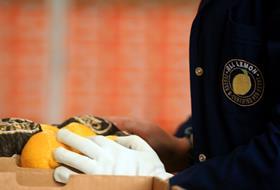
All Lemon has reported a 25 per cent increase in shipments in 2015 compared to last year, in spite of facing a challenging production season and difficult market conditions.
Production was forecast to rise by 60 per cent this year after reaching a historic low of 750,000 tonnes in 2014. However adverse weather once again reduced the volume of fruit available for export.
“Although we did not return to the traditional volumes of what is considered a normal year, this was only because of complications caused by adverse weather,” said All Lemon president Romain Corneille.
Corneille said the resulting quality issues had made 2015 a very difficult campaign to manage and as a result the association’s members had to intensify their quality control efforts, resulting in very low output from each packhouse as companies did their utmost to comply with the quality assurances stipulated under the quality seal.
Shippers faced an equally challenging economic panorama this year. The benefits of stronger, more stable pricing in Europe and other markets were partly offset by the negative impact of the strengthening US dollar since most lemons are sold in European currencies but returns are converted back into dollars before re-entering the country.
Ricardo Trapani of FGF Trapani also pointed out that “prices in Russia were attractive at a local currency level but in the final equation the devaluation of the rouble also played a key role in eroding the FOB prices, which are measured in dollars.”
Trapani added that the stricter entry rules imposed by the Russian authorities as part of the ban on EU agricultural products –specifically those related to fruit labelling – had generated some “operational complications” for the quality seal.
Meanwhile, the industry moved a step closer to regaining access to the US market following a visit in July by representatives from the USDA-APHIS to northwestern provinces of Tucumán, Salta, Jujuy and Catamarca and the establishment of a working plan towards reopening the market.
“We hope that the US will now begin the process of public consultation during which the various stakeholders from both countries can make their comments with regards to the proposed import regulations for shipments of lemons from the north west of Argentina to the US,” said Daniel Lucci of Citrusvil, who added that the meticulous scientific work carried out in Argentina together with the support of All Lemon had been crucial in demonstrating the quality and safety or Argentine lemons.
All Lemon said it had also made significant progress in other new markets. As well as exhibiting at the inaugural China Fruit and Vegetables Fair in Beijing in September, the quality seal once again took part in Asia Fruit Logistica in Hong Kong and World Food Moscow. Lucci noted that India was another potential new market the group was studying.
Elsewhere Think Lemon, All Lemon’s campaign to boost lemon consumption worldwide, had got underway with a pilot project in Argentina targeting the end consumer as well as to study consumer behaviour in relation to lemon usage and consumption. The association said a range of online and offline promotional activities are planned for the rest of the year.






No comments yet